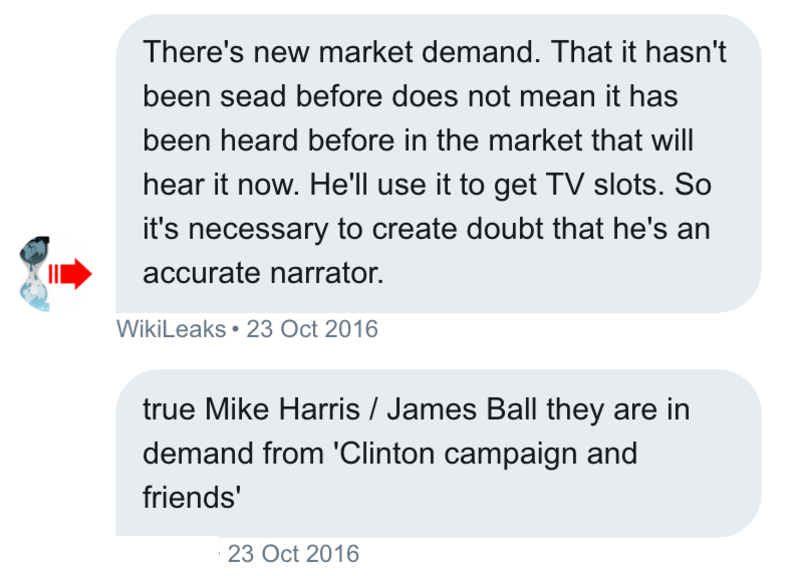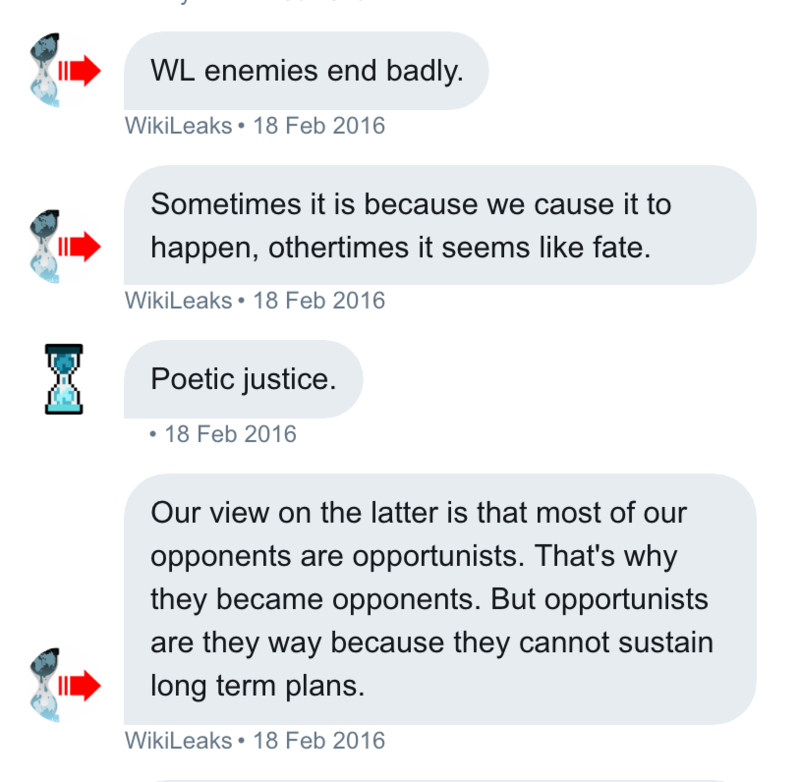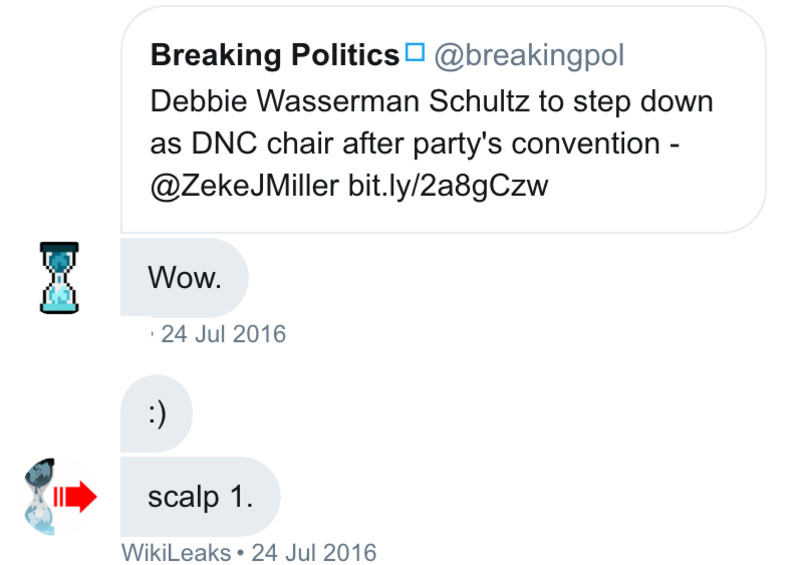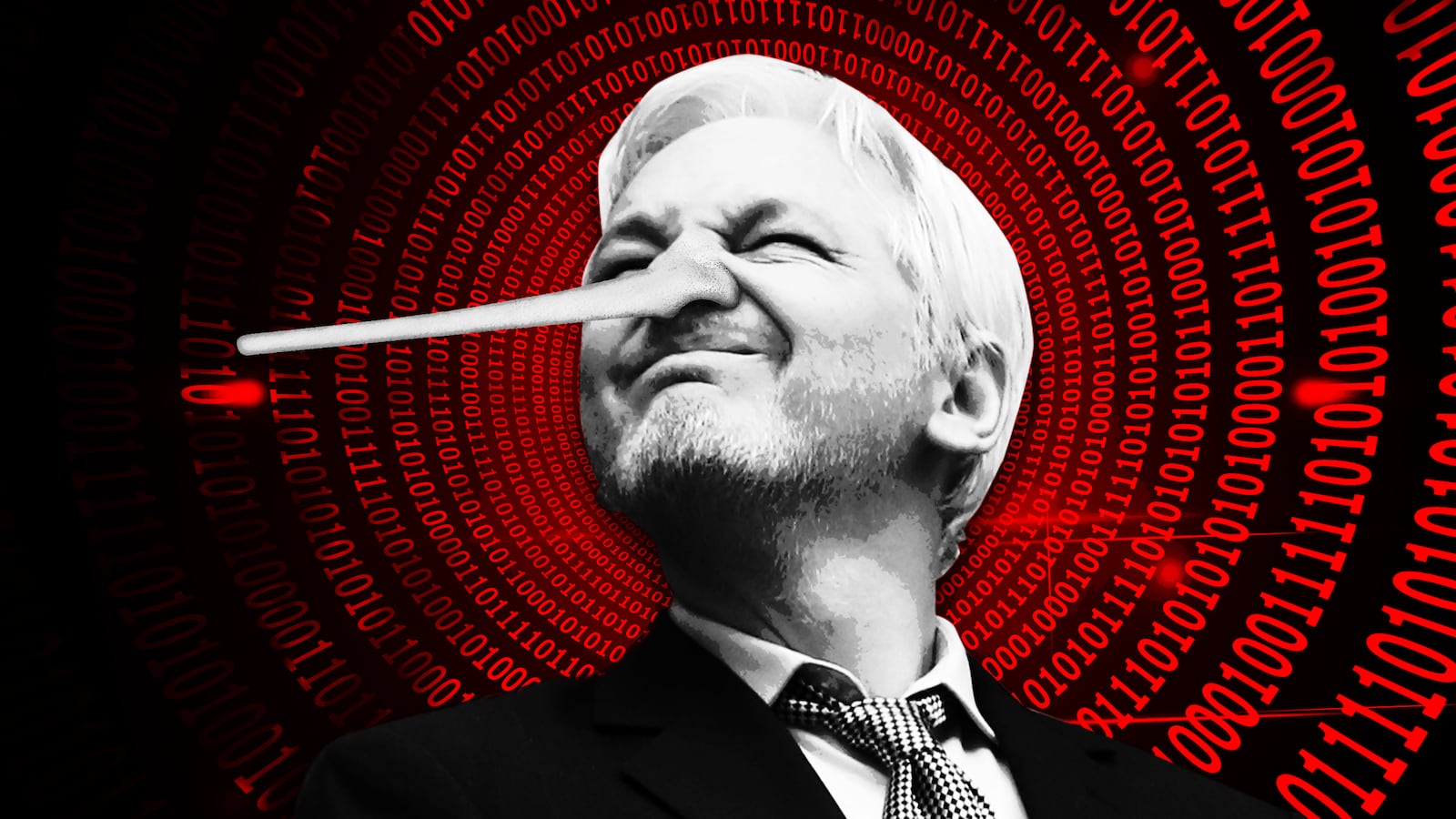Last February, leaked messages from a private WikiLeaks chat group offered an unfiltered glimpse of Julian Assange, complete with misogyny, anti-Semitism, and a clear, early preference for a GOP election victory. Now the U.K. man who leaked those messages is stepping forward to explain why he turned on the secret-spilling group, which he argues has abandoned its truth-telling mission altogether.
Iain (The Daily Beast has agreed not to use his last name) is a 41-year-old writer, artist, and musician based in Edinburgh who joined a small circle of key WikiLeaks supporters after meeting with Assange in 2013, and remained connected to the group until October 2016.
“I never understood at the time that these people are really quite fanatical, and not in a good way,” said Iain. “They will lie to your face, they will lie on Twitter… The pressure is being piled on, the lies are being piled on.”
Iain knows he faces risks by publicly criticizing WikiLeaks now. Previously unpublished portions of the message logs show that Assange harbors lasting animus for those he views as opponents and traitors. While strategizing a response to a critique by former WikiLeaks volunteer James Ball, Assange lays out the need “to create doubt that he’s an accurate narrator.” Of Birgitta Jónsdóttir, an Icelandic politician who worked with Assange on the first big WikiLeaks release, he writes, “There’s no trust, one cannot trust a back-stabber, but there is an alignment of interests.”


In February 2016 Assange offered this this ominous observation: “WL enemies end badly… Sometimes it is because we cause it to happen, other times it seems like fate.”

Iain entered WikiLeaks’ orbit in 2012. He was a longtime liberal anti-war activist, but until then most of his political engagement had been through his art. He felt the need to become more directly involved in a worthy cause. WikiLeaks faced global pressure during the Chelsea Manning leaks, and Iain was outraged that so many mainstream news outlets that had benefited from those leaks had later turned on Assange.
He got Assange’s attention through supportive posts on Twitter and his now-dormant website, titled Martha Mitchell Effect and later Hazel Press. In 2013, his writing style and staunch support of WikiLeaks led Ball, by then a journalist at The Guardian newspaper, to accuse him publicly of being Assange writing under a pseudonym. The real Assange was amused by the mixup and invited Iain to the Ecuadorian Embassy in London for a visit, according to Iain, who told his story to The Daily Beast in a telephone interview and over email.
He made the visit that spring, settling into an embassy office that served as Assange’s living space for a chat that stretched to three or four hours. “It was very relaxed,” said Iain. “He’s very charismatic, nattering away about all kinds of stuff, and he’s very well informed.”
Assange began granting Iain insider access for some of his articles and promoting them reliably over the WikiLeaks Twitter feed, while Iain occasionally filed Freedom of Information requests on Assange’s behalf. In May 2015, at WikiLeaks’ request, Iain set up a private Twitter direct messaging group called “WikiLeaks Plus 10” for Assange, himself, and other key online supporters. The group was described as a “low-security channel for some very long term and reliable supporters who are on Twitter.”
It’s the logs from that group—containing more than 11,000 messages, over 1,200 of them from the WikiLeaks Twitter account—that Iain leaked to The Intercept late last year. It led to a 3,000-word exposé accompanied by redacted excerpts from the log. Assange responded to the story in a series of tweets accusing one of the reporters of harboring an anti-WikiLeaks bias. He dismissed the leaked messages as “freewheeling banter and quips” and not “editorial policy.”
Iain said he felt compelled to leak the messages after the revelation that Assange held friendly, supportive online conversations with Donald Trump Jr. during the election. Before then, Iain had struggled to understand WikiLeaks’ sudden embrace of the alt-right. After the Trump Jr. chats emerged, Iain went back over the logs of the WikiLeaks Plus 10 group chats and also dug into Assange’s pre-WikiLeaks history. “What happened in 2016 was just so shocking to me. I was just trying to figure out, What was that? Where did it come from? And so I started looking back.”
He finally found what he sees as a kind of Rosetta Stone into Assange’s thinking in a leaked email Assange wrote way back in 2007 while soliciting support for the nascent WikiLeaks concept. One of the goals for WikiLeaks, Assange wrote, “is total annihilation of the current U.S. regime and any other regime that holds its authority through mendacity alone.”
The “total annihilation of the current U.S. regime” line, which got some attention during the Chelsea Manning leaks, explains everything, said Iain, including Assange’s curious embrace of alt-right conspiracy theories and memes during the 2016 election season and beyond.
WikiLeaks baffled some supporters when it started seeding or promoting fake news about Hillary Clinton’s health, Pizzagate, and even Democrats engaging in satanic rituals at the same time it was releasing genuine material stolen from the Democratic National Committee and the Clinton campaign.
This was not, as it might appear, a cynical bid to garner Donald Trump’s favor; nor was it simple pandering to a new funding base, argues Iain. It was part and parcel of Assange’s alignment with Russian President Vladimir Putin against their common adversary, the United States.
In retrospect, the shift was apparent way back in 2013, during Assange’s failed bid to win a Senate seat in Australia, Iain said. To that end Assange established the country’s WikiLeaks Party, with a platform built on government transparency and libertarianism. But just weeks before the election the party was roiled by a controversy over its ranking of other political parties in Australia’s ranked-choice voting, preferencing, in two races, the white-nationalist Australia First Party and the right-wing Shooters and Fishers Party above the liberal favorite, the Australian Greens.
The WikiLeaks Party blamed the choices on an “administrative error,” and Assange took to Australian TV to deny any role in the scandal, saying he was too preoccupied helping Edward Snowden to pay attention to what was happening in the party he led.
But as soon as the election was over, the WikiLeaks Party transformed. Its website was suddenly overrun with posts that would have been at home on Kremlin outlets like RT and Sputnik. “The puppet politicians who Washington intended to put in charge of Ukraine have lost control,” read a post on the Ukraine conflict. “The government of Crimea, a Russian province… has disavowed the illegitimate government that illegally seized power in Kiev and requested Russian protection.” Posts on Syria described the 2013 Ghouta chemical-weapons attack by forces loyal to Bashar al-Assad as “unsubstantiated” and “staged.”
“The party’s website content now operated solely to legitimize Russian propaganda by placing it under the umbrella of WikiLeaks’ valuable brand of truth and transparency,” said Iain.
Four months after the election, in December 2013, Assange’s father, John Shipton, led a WikiLeaks Party delegation to Damascus and had tea with Assad. Shipton, the party chair, told a local TV station that the WikiLeaks Party wanted to open an office in Damascus, and after the trip the party tweeted that its members had seen firsthand “how Syrians defeated the conspiracy of more than 86 countries.”
Iain was appalled by all of this and wrote articles lambasting the WikiLeaks Party’s new direction. Despite Assange’s smiling photo on the front page of the party website, Iain accepted Assange’s assurances that he had nothing to do with the party’s overnight embrace of Putinism, until WikiLeaks followed precisely the same path to influence America’s 2016 election. In October 2016, Iain withdrew from the WikiLeaks Plus 10 conversation and ended his public support for WikiLeaks.
More than a year later, when the Trump Jr. chats surfaced, he returned to the chat group one last time to archive the contents for a wikileak of his own.
“Information and false information have always been weapons, used at all levels of society, from the family structure to the state, and WikiLeaks... uses both, and not just to inform or mislead society, but to literally reshape it according to a singular viewpoint,” said Iain. “It is a viewpoint that speaks of ‘annihilation’ and then acts in the taking of political ‘scalps.’

“It has succeeded in empowering harmful fascistic structures against those who believe in and uphold progressive values,” he continued. “As a result, it is and will remain dangerous to all of us, whether we know it or not.”






